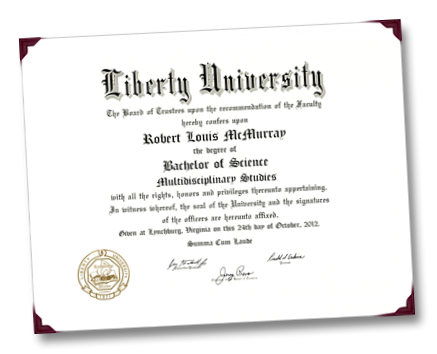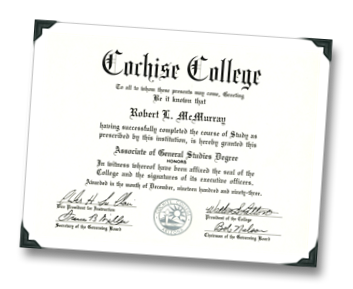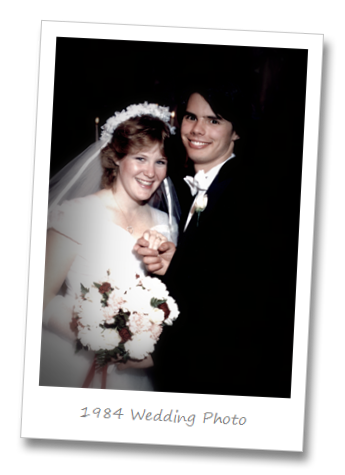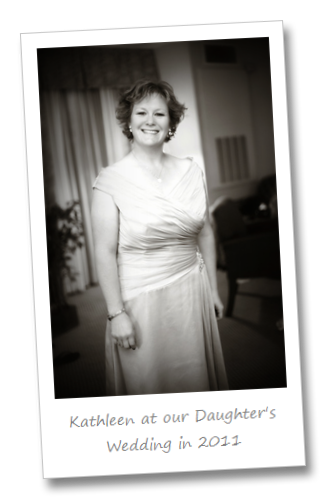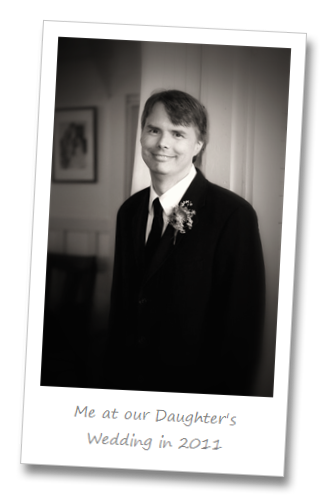It's Never Too Late to Go Back to School
30 October 2012 • by Bob • General
After two long years of sacrificing my evenings and weekends in order to complete homework assignments, I just received the following in the mail:
This obviously signifies that I have finally earned my Bachelor's Degree. This is traditionally a four-year degree, but I managed to complete my degree in just over 28 years from when I first started college. (So anyone who is currently on a five-year plan for their four-year degree, take my word for it - you could do a lot worse.)
By way of explanation, I had never finished my Bachelor's Degree; I dropped out of college during my freshman year when I got married and we needed the money. Our idea at the time was that I would work full-time while my wife went to school full-time, then we would swap roles when she completed her nursing degree. Unfortunately, our lives didn't work out that way. Shortly after I dropped out of college I joined the US Army, and that put a temporary halt on both of our college aspirations as the military continuously transferred us from one location to another.
After five years in the Army, I was finally at a time and place in my life where I could go to college in the evenings and do my homework during the weekends. Because of this, I received my Associate's Degree around the time that I finished eight years in the military; this meant that I had earned my two-year degree almost 9 years after I first started college.
A few months after I received my Associate's Degree I left the Army, and my plan at the time was to go to school and finish my Bachelor's Degree. But once again, my plans didn't work out that way. Sometime during my first year back in school, Microsoft offered me a job, and that opportunity was simply too good to pass up. This was ultimately a great decision, but it meant that my college goals needed to be put on hold again.
Sometime around my fifteen-year anniversary at Microsoft I decided that I was once again in a time and place in my life where I could go to college in the evenings and weekends, so I enrolled in an online program through Liberty University. (I chose this school because their online programs are very friendly to current and former members of the military.) My declared major was Multidisciplinary Studies, which is a fancy term for a program that allows you to split your major into two or three concentrated subject areas. (I chose Computer Science and Religion.)
Jumping ahead a couple of years, I found myself studying hard to complete all of my upper-division courses while putting three children through college, flying around the world to speak at various technical conferences, surviving the weddings for two of my children, and juggling a work schedule that typically comprised 50 to 60 hours a week.
In the end, I finished all of my courses at Liberty University in just over two years - and I managed to maintain a 4.0 GPA throughout my studies, thereby graduating Summa Cum Laude. (Which is probably Latin for "You really need to get a life.")
So if I do the math correctly, it took me 9 years to get my two-year degree, and it took me an additional 19 years to get my four-year degree. At this pace, I should have my Master's Degree 29 years from now.
;-]
Weight Loss Recap for 2011 - and Why I Won't Write a Book
31 December 2011 • by Bob • General
One of my favorite comic strips is Pearls Before Swine, and the comic from September 30th, 2011, sums up why I would never be able to write a book about weight loss:
If you had read my blog post entitled The Geek's Guide to Weight Loss, you would have noticed that all I did to lose 50 pounds in six months was to eat less calories each day than my body uses on a daily basis. In the following six months, I've kept off the weight by making sure that I eat only as many calories as my body actually needs.
As a year-end recap, here's my average weight month-by-month for 2011:
| Month | Average |
|---|---|
| January | 203 |
| February | 190 |
| March | 178 |
| April | 171 |
| May | 166 |
| June | 164 |
| July | 160 |
| August | 160 |
| September | 159 |
| October | 159 |
| November | 160 |
| December | 161 |
My day-to-day chart for the entire year looks like the following:
I had a spike of a pound or two at Christmas - nobody's perfect. ![]()
A Few Thoughts on my 27th Anniversary
29 December 2011 • by Bob • General, Marriage
When I was a child, there was an excitement that preceded Christmas as it approached each year. I am sure that most everyone knows what I mean by that statement; whether you are longing for Christmas, Hanukah, Ramadan, Kwanzaa, or even if you are an atheist that participates in some form of secularized holiday celebration. There is a sense of childhood excitement that surrounds the season; it could be the gifts, the decorations, the music, or a host of other contributing factors.
In a small way, I experience something like that feeling each week of the year; every Wednesday night for the past decade or so, my wife and I have had "Date Night." I do my best to never schedule anything that conflicts with this tradition; and as each Wednesday comes around, I look forward to going out to dinner or a movie with my wife in something of that same good-natured attitude of child-like expectation that I used to have at Christmas.
Date Night is a recent endeavor for us; which is unfortunate, but somewhat unavoidable. Both Kathleen and I went directly from living at home to being young, married, and poor; and soon after that we became parents. We were great friends in High School and our first year of college, but we jumped forward several years almost overnight; and as a result, we went from being children to being parents with barely a chance to discover who the other person really was.
Please don't misunderstand me - parenthood was a mixed blessing of training and teething, schooldays and sporting events, chaos and concerts, happiness and heartaches; and I would not trade a moment of my joys or sorrows as a parent. (Well, maybe I could do without the memories from one of my daughter's first boyfriends - and he knows who he is. ![]() ) But that being said, Kathleen and I missed out on the opportunity to explore who we were as a couple all those years ago; which is why I enjoy each week's rediscovery that long before I loved my wife, I actually liked my wife.
) But that being said, Kathleen and I missed out on the opportunity to explore who we were as a couple all those years ago; which is why I enjoy each week's rediscovery that long before I loved my wife, I actually liked my wife.
There is a wonderful scene in the musical Fiddler on the Roof where the main character, Tevye, asks Golde, his wife of twenty-five years, "Do you love me?" I didn't fully understand this scene when I was younger; I simply thought that it was amusing.
But in recent years, Golde's responses to Tevye's simple questions have impacted me differently.
"For 25 years I've washed your clothes,
Cooked your meals, cleaned your house,
Given you children, milked your cow.
After 25 years, why talk about love right now?
"For 25 years I've lived with him,
Fought him, starved with him.
25 years my bed is his;
If that's not love, what is?"
I truly loved my wife on the day that we exchanged rings and we both said "I do" before our friends and family. The reasons why I loved my wife on that day are still there: she has an odd sense of humor, we complement each other well, and she is my best friend. But the trials and tribulations that we have endured together over the past twenty-seven years have changed the dynamics of that relationship.
In our marriage vows Kathleen and I promised to love each other for richer or poorer, for better or worse, and in sickness or in health; and we have endured each of those seasons in due course over our many years of marriage. It is precisely that collection of experiences that has bonded us together in ways for which a night out every week could never substitute; in much the same way that veterans of a war are bonded together in a way that supersedes the love between the closest of siblings.
Two years ago, on our twenty-fifth anniversary, I gave Kathleen a framed portrait that contains our wedding photos and the following quote from Mark Twain:
"Love seems the swiftest, but it is the slowest of all growths. No man or woman really knows what perfect love is until they have been married a quarter of a century."
In many ways that sums up my feelings: I loved my wife when I was nineteen for as much as I understood that concept at the time; but now that I am somewhat older, and perhaps somewhat wiser, I love my wife in ways that I couldn't possibly have understood back then. I tell Kathleen every day that she is my favorite person; and because of that, every week may not be Christmas, but just the same - I look forward to spending each week with her all the more.
The Geek's Guide to Weight Loss
08 November 2011 • by Bob • General
I've had a lot of questions from a lot of people over the past few months about my extreme weight loss this year, so I thought that I'd post a few words to explain how I accomplished that. To put things in perspective, between the start of January, 2011, and the end of June, 2011, I lost 50 pounds (22.7kg). What's more, I've kept the weight off for an additional five months.
Here's the story behind all of that.
Falling Apart (or Bursting at the Seams)
First of all, I knew that I was really overweight.
In December of 2010 my weight reached 210 pounds. As I had watched my weight grow over the years, I had a series of "superhero" names that I called myself:
- First I was "Porky Boy."
- Next, I was "Fat Man."
- Later, I was "The Obese Avenger."
- I was rapidly growing into "The Morbid Marauder."
I made all the usual comments at my own expense:
- "I'm in shape - round is a shape."
- "I have six pack abs - I'm just keeping my six pack insulated."
- "I'm watching my weight. It keeps going up, but I'm watching it go up."
I went into something of a denial phase - I started buying my pants from one particular store, because their brand of jeans were actually larger than their advertised size. So I felt better about the fact that I was wearing jeans that were advertised as size 36, when I was really wearing size 38 or larger. Even then I had a serious "muffin top" that would hang over the top of my jeans. I never tucked in my shirt in order to help disguise my condition.
I knew things were bad when a cab driver in Iquitos, Peru, charged an extra fare for my wife and me because he said that we were too fat. (Actually, he didn't say it, he pointed at me and gestured like I was a balloon inflating.)
But all joking aside, I knew that I was in trouble because my blood pressure had elevated to 170/120, which is dangerously high. (120/80 is normal.) I decided to start exercising, and in early January, 2011, I had barely made it 15 minutes into a workout before I thought that I was going to have a stroke. That's when I realized that I needed a doctor to help me get started.
With this in mind, I took a week off for vacation, and I spent most of that week visiting doctors. I saw a general practitioner who put me on medicine to control my blood pressure. I also saw a neurologist because of my frequent headaches, which were actually chronic migraines. (Undoubtedly due to the blood pressure.) I saw a bunch of other doctors for a variety of additional medical symptoms that I was experiencing, but for the sake of expediency I'll spare you the details.
To make a long story short, it seemed like I was falling apart.
Exercising and Counting Calories
Within a few days, the blood pressure medicine did the trick; I could keep my blood pressure low and complete a workout. For exercise, I bought a treadmill from NordicTrack that connected to www.ifit.com, which allowed me to track the distances that I walked each day. (Hey - if you're a geek, it shows up everywhere.) I bought several series of documentaries on DVD from the History Channel and the Discovery Channel, and I would watch those documentaries while I walked for an hour or so.
I also created a measured walking path through buildings 16, 17, and 18 on Microsoft's main campus; these buildings are connected by glass-covered walkways, so I could still walk when the weather was nasty outside. My walking trail was around three-quarters of a mile long, and it took me about 15 minutes to walk it. It's interesting, because I had never noticed before how many people put out cookies and candies in the hallways. I could ignore all of it - but it's kind of funny that I hadn't paid much attention before.
I have to stress that I did not do a lot of exercise to lose the weight - I mainly started counting the calories for everything that I ate, and I tracked those calories diligently. (I'll explain more about that later.)
My general method of calorie counting was to calculate my Resting Metabolic Rate (RMR), then I would subtract 1,000 calories from that. Whatever was left was the calorie count that I was allowed to eat for the rest of the day.
Here's what that looks like:
There are lots of websites that will help you find the calories for meals, although I liked http://www.livestrong.com/myplate/ the best. I also created a OneNote file that I could read on my SkyDrive and through the Office application on Windows Phone 7 where I listed the calories for the foods that I eat the most; this made it easier to keep track.
It got to the point where I would say to myself, "I really want to eat those M&M's, but I'll have to work out later to burn off those calories." I also learned to browse to a restaurant's website before going out to dinner and picking my meal by calculating the calories ahead of time. In order to help cut down on craving, I stocked my desk with a bunch of 90-calorie snack bars. Those or a bowl of oatmeal became my daily breakfast, and in between my reduced-size meals I would have a snack bar.
I should stress that I did not give up the foods that I like - it may be healthier to do so, but I don't think that's sustainable for some people. (That includes me.) I would still have pizza, or a Qdoba burrito, or a burger from Five Guys; but I would simply have less of everything. If I had a burger somewhere, I'd skip the fries. I'd only have a couple slices of pizza, instead of eating the whole pizza. Keeping the weight off is about sustainability - and eating food that I like in moderation works for me.
I should also point out that at no time was I actually hungry during my weight loss period; that's where the snack bars paid off. Instead of being famished when lunch or dinner rolled around, I could get by with a simple meal of 300 or 400 calories and be satisfied with that.
As long as I stuck faithfully to counting my caloric intake on a daily basis, my weight and the inches around my waistline started to recede.
Losing Weight (while Undoing Years of Abuse)
After five weeks my weight had dropped 20 pounds; my pants were fitting a lot looser, and a few people started to take notice. This was fuel for my self-motivation; the fact that someone could actually see that I was losing weight was great, and it made everything worth the effort. Of course, I still weighed 190 pounds, which was 25 pounds overweight, so any elation was short-lived.
As an added bonus, my weight had dropped so much that I no longer needed the medicine to control my blood pressure. In fact, the medicine was making my blood pressure way too low. One day I finished a workout and I felt a little light-headed. So I took my blood pressure, and I discovered that it was 80/60, which is low enough to pass out. (I stopped taking the blood pressure medicine immediately.)
After losing 30 pounds it was kind of cool - I could tell by looking in a mirror that my face was thinner, and more people started mentioning that it looked like I had lost some weight. But I was still faced with the knowledge that even though I had lost 30 pounds - which was significant for only two months' worth of effort - I still weighed 180 pounds, which put me 15 pounds into the "Overweight" weight range.
When I had lost 45 pounds in May, 2011, I hit my initial weight loss goal. This put my Body Mass Index (BMI) at 25, which was the high end of the "normal" range. To celebrate, I took a break from actively losing weight for a couple weeks, and I went into maintenance mode. So for the next month I continued to count my calories, and I simply kept my weight at 165 pounds.
During my brief respite from active weight loss, I had a follow-up appointment with the same doctor with whom I had met in January. He was shocked when he saw me, and he asked me what had happened. I replied that I didn't want high blood pressure, sleep apnea, and heartburn for the rest of my life. More than that, I didn't want to have to worry about a stroke or heart disease. The doctor gave me a clean bill of health, and a couple of weeks later I started losing weight again.
By the end of June or the beginning of July, I had hit my ultimate weight loss goal of losing 50 pounds, and I've kept it off since then. My waistline went down several sizes, so I have had to change my daily wardrobe through several successively-smaller sets of jeans, which was a great feeling.
Here's what my weight loss chart looks like for the year of 2011 (so far):
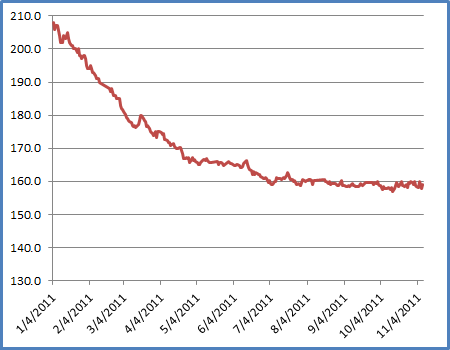
The After Effects
First and foremost - I feel great. I have no more migraines, I sleep better, my heartburn is gone, my blood pressure is back to normal, and I have lots more energy.
I'm also in much better shape. In fact, my wife and I walked the Leavenworth Half-Marathon in October, 2011; and here is a photo of the two of us crossing the finish line:
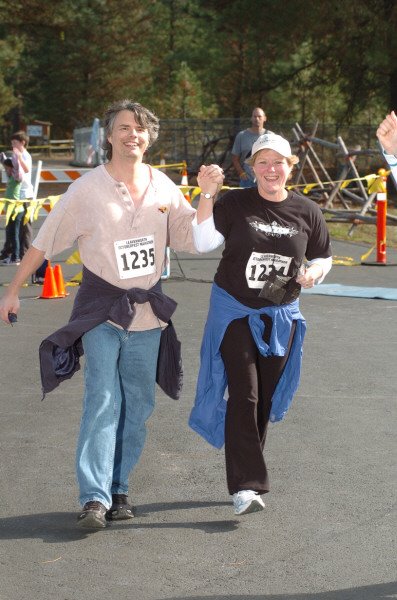
I thought that it might be good to show a set of "before and after" photographs, just so you can see the difference that 50 pounds can make:
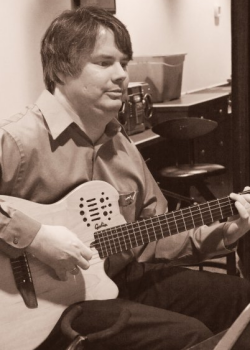 |
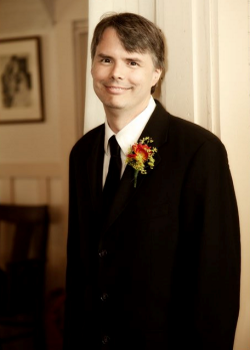 |
| December, 2009 | July, 2011 |
(My thanks to Rebecca Calvo for the photos!)
How Anyone Can Lose Weight
A while ago I posted some weight loss information to Facebook in order to answer a few people's questions about my experiences; since I keep my list of friends on Facebook pretty small, I thought that I'd share some of that information here. But I also wanted to make it a little more up-to-date with some additional information.
My secret to weight loss? Microsoft Excel.
Well, it's a little more than that - but it's mostly just counting my calories and making sure that I eat 1,000 calories less per day than my Resting Metabolic Rate (RMR), for which I use Mufflin equation:
- For Men: (10 x w) + (6.25 x h) - (5 x a) + 5
- For Women: (10 x w) + (6.25 x h) - (5 x a) - 161
Where:
- w = weight in kg
- h = height in cm
- a = age
I converted this equation into the following complex Excel formula:
=((10*(B2/2.2))+(6.25*(B3*2.54))-(5*B4)+IF(B1="Male",5,-161))*IF(B5="Extremely Active",1.9,IF(B5="Very Active",1.725,IF(B5="Moderately Active",1.55,IF(B5="Lightly Active",1.375,1.2))))
Where:
- B1 = Male or Female
- B2 = Weight (in pounds)
- B3 = Height (in inches)
- B4 = Age (in years)
- B5 = Activity Level (Sedentary, Lightly Active, Moderately Active, Very Active, Extremely Active)
To make things easier, I created the following spreadsheet to help me track my calories:
Geeky Bob's Weight Tracking Spreadsheet
If you want to use it, here's how it works - there are two worksheets in the spreadsheet:
- On the Settings worksheet, you enter your weight, height, age, activity level, and the number of pounds that you want to lose in a week. You should only shoot for a maximum of two pounds a week; anything more is really unsafe, and your body will respond by slowing down your metabolism to conserve resources.
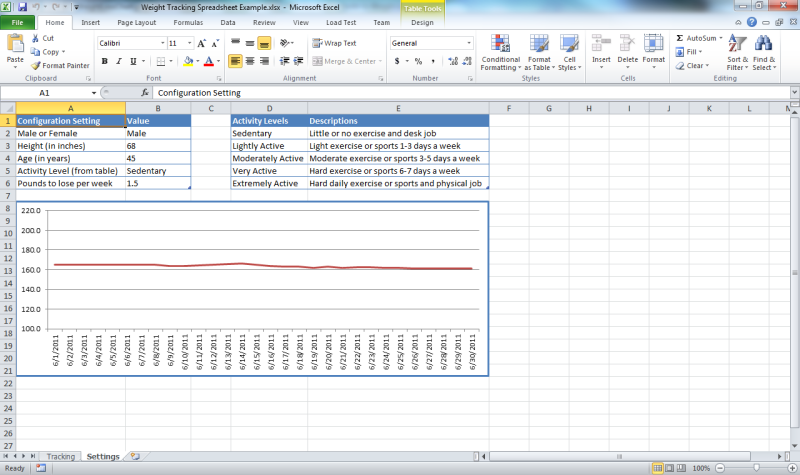
- On the Tracking worksheet, you enter the date and your weight, and the spreadsheet uses this information and the information from the Settings worksheet to calculate your Body Mass Index (BMI) which should be below 25, and your Resting Metabolic Rate (RMR) which is the number of calories that your body burns just to keep you alive.
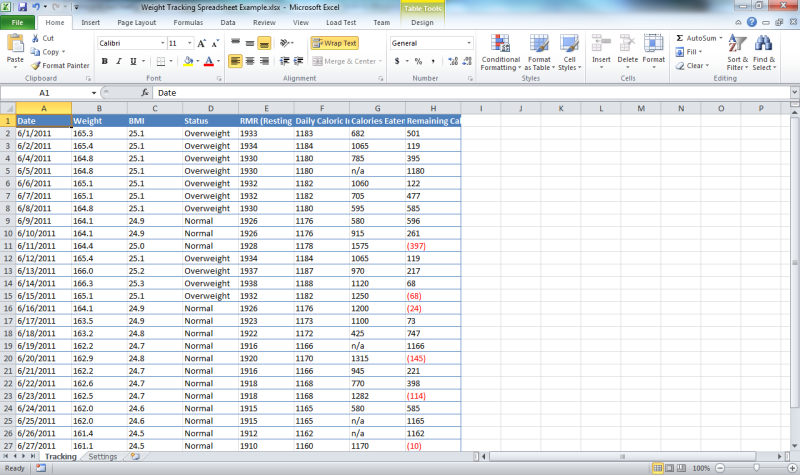
The remaining columns in the spreadsheet will tell you the number of calories that you can eat based on your weight loss goal. As you enter the number of calories that you have eaten (by using a formula like "=100+200+300") the spreadsheet will let you know how many calories that you have remaining for the day. As long as you keep your remaining calories above zero, you should be losing weight.
So there you have it: Microsoft Excel is the Geek's Guide to Weight Loss.
;-]
